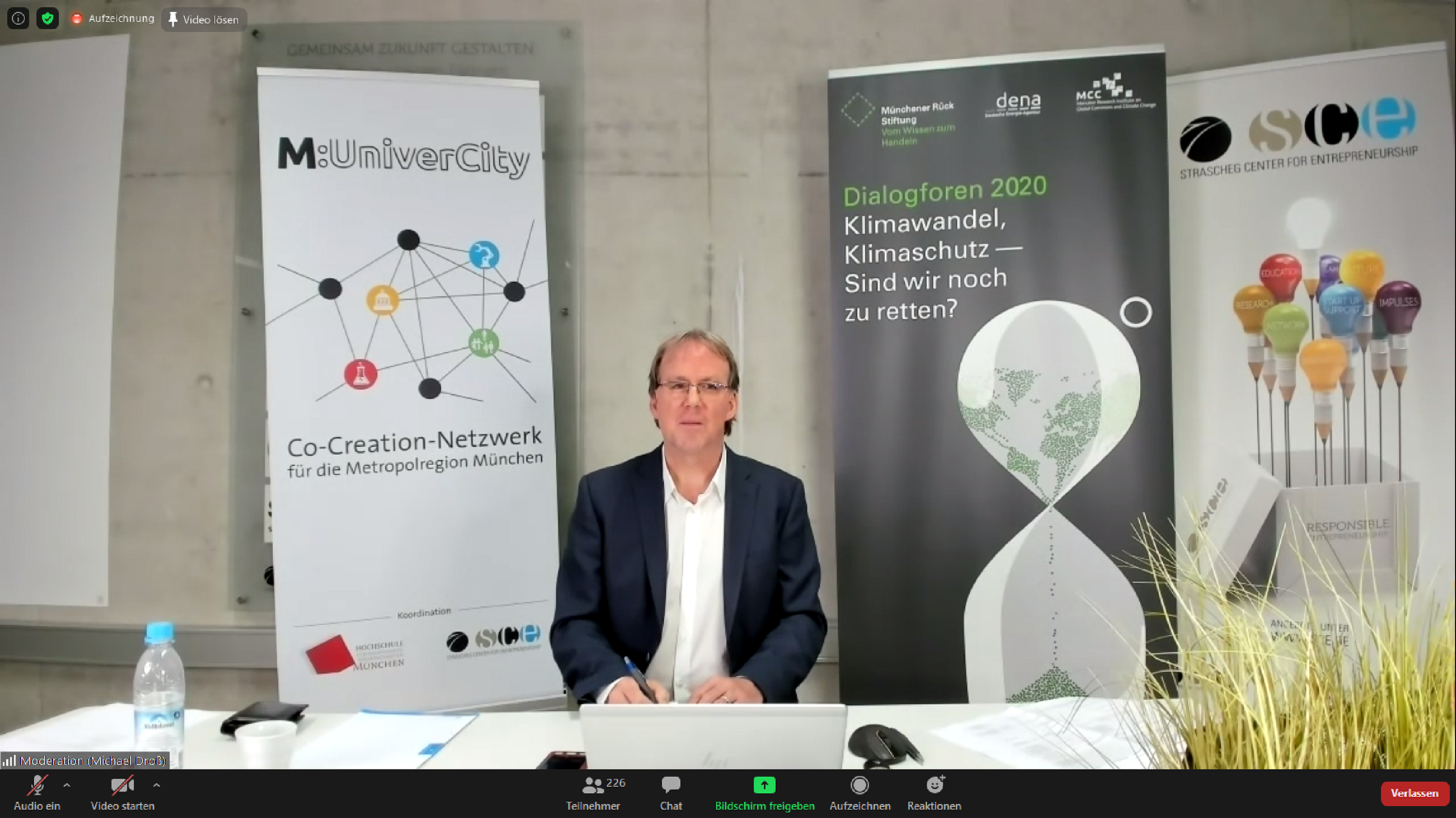
Car-free urban quarters:
Soon to be in Munich too?
properties.trackTitle
properties.trackSubtitle
Virtual Dialogue Forum at the Munich University of Applied Sciences on 12 November 2020

Experiences in Messestadt Riem
In Munich, too, there have already been attempts to create a car-free district, for example in Messestadt Riem, which was built in the 1990s. But even there, it has been shown that “entirely car-free” is not possible, explained Clemens Baumgärtner, Head of the Department of Labor and Economic Development of the City of Munich. That's why he believes: "The car-free city is currently more of a wishful thinking. When we talk about urban policy, we have to face reality".
"The proof of the pudding is in the eating," said Hannah Henker, an engaged city dweller who is committed to car-free projects. Munich had to become more climate-friendly and fairer, and courageous steps were needed to achieve this. "Courageous means that there will be noticeable changes and that we also expect something from the people". In detail, this means fewer cars, but more alternative mobility offers and a stronger involvement of citizens in the planning process. "We must take people's fears seriously and show that a good life is possible without cars, so that the positive effects are better perceived," demanded Henker.
Andrea Benze, Professor of Urban Planning and Urban Theory at the Munich University of Applied Sciences, emphasized the role of public space in a city for social cohesion: "Public space plays an important role in the meeting of people and thus creates the conditions for an inclusive city and the cohesion of its citizens. She even believes that car-free neighbourhoods offer so many advantages that they could soon replace the dream of a house in the countryside. She cited the city of Rotterdam as a successful example, where around 90 people in one neighbourhood have given up their cars. The space gained by the elimination of parking spaces could be used by the local people as a meeting and recreation area. "As a result, people have a completely different view of not having a car," Benze is convinced.

Pilot project "summer streets"
Munich has at least temporarily created so-called "summer streets" as pilot projects in order to meet the corona-related higher demand for playing and moving areas in the highly dense urban area. The "Referat für Stadtverbesserung", an association of students of architecture and urban studies at the Technical University of Munich, has also presented its vision of a car-free city in a project in the Schwanthalerstrasse. With lots of greening measures and no parked cars, a liveable street space was created for one day, which was well received by the population. "Since car-free means an upgrading of the neighbourhood, a kind of gentrification brake must ensure that people can stay living there," Markus Westerholt from the "Referat für Stadtverbesserung" said.
"Many people may wish for a car-free city, but they want to make exceptions for themselves," assumed Baumgärtner. In addition, he said, one should not forget the importance of traffic for economic development. "The concept of car-free neighbourhoods will only work well if we take the economy with us and don't present it as a fait accompli," he clarified. Especially in a location like Munich, where BMW, for example, is an important actor as employer and also initiator of ideas (DriveNow, Inzell Initiative). Baumgärtner wants to get the problem of emissions from motor vehicles under control by increasing the use of hydrogen as fuel. Despite all skepticism, he would not reject attempts to create car-free districts in Munich per se. "If there are really enough people who are in favour of this, then I will gladly be proven wrong."
Courage for new mobility concepts
"Transport turnaround means more than just focusing on the means of transport. Rather, it is about the question of how to use space differently than today and how to create a greener and more liveable city," said Magdalena Schmidkunz from the "Referat für Stadtverbesserung". New mobility concepts would require courage, she said, and one would have to experiment instead of dismissing new approaches as illusions from the outset.
"We don't have to change everything overnight, but we can make the car-free city a tangible experience with pilot projects," suggested city planner Benze. She is convinced that, if people then perceive the advantages, acceptance will also increase. "In addition, the term car-free needs to be considered in a more differentiated way. It is about a reduction of motorized individual traffic, not a complete abolition," she made clear. She would like the city to promote bicycle traffic more strongly, following the example of Copenhagen. "There, 20 euros per inhabitant and year flow into the bicycle infrastructure, in our case this is perhaps just 15 percent of that amount.”
Apparently, there is no shortage of ideas for a city that is no longer dominated by the car. What is clear, however, is that we will have to give up some cherished habits or conveniences on the way there. It also does not seem to be very helpful to play off the various road users against each other. And last but not least, we need to see what the turnaround costs and how much a more livable public space is actually worth to us. We can only make this decision together!




